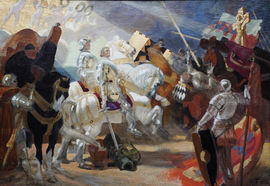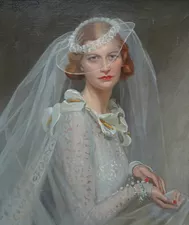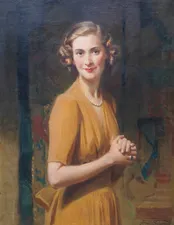Frank Owen Salisbury (1874-1964)
Francis "Frank" Owen Salisbury (18 December 1874 – 31 August 1962) was an English artist who specialised in portraits, large canvases of historical and ceremonial events, stained glass and book illustration. In his heyday he made a fortune on both sides of the Atlantic and was known as "Britain’s Painter Laureate". His art was steadfastly conservative and he was a vitriolic critic of Modern Art – particularly of his contemporaries Picasso, Chagall and Mondrian. His father, Henry Salisbury, described himself as a "plumber, decorator and ironmonger" (his mother was Susan Hawes), yet his son Frank would become one of the greatest society artists of his generation. One of 11 children, Salisbury was such a delicate child that he was educated at home, in the main by his student teacher sister, Emilie. He had only a few weeks formal schooling and began work by repairing bicycles at his father’s Cycle Depot in Harpenden. Uncertain as to his ability to find and maintain a job, the family determined that he be apprenticed, at the age of 15, to Henry James Salisbury, his eldest brother, who managed a major stained glass company in Alma Road, St Albans. He rapidly acquired all the practical skills of a stained glass artist and exhibited exceptional skills in the painterly detail that was applied to glass before its final firing. This led to his brother sponsoring him to attend Heatherley’s School of Art three days a week to further a career in painting. He then won a scholarship to the Royal Academy Schools which he attended for five years and where he won two silver medals and two scholarships, including the Landseer scholarship which funded his to travel to Italy in 1896. In due course he would have seventy exhibits accepted for the annual Royal Academy Summer Exhibitions, from 1899 until 1943, though he was never offered membership, which reportedly disappointed him very much. In 1901 he married Alice Maude (d. 1951), daughter of C. Colmer Greenwood, with whom he had several children, including twin daughters Monica and Sylvia. His first Royal Academy exhibit was a portrait of Alice and he often painted pictures of their children. It is for portraiture that he is best known. His speed in producing portraits stemmed from his painting his own twin daughters every morning for an hour and his career began with child portraiture and his painting the Hertfordshire gentry and members of the Harpenden Methodist Church. He had a studio at his home, Sarum Chase. A providential meeting with Lord Wakefield, founder of Castrol Oils and a Methodist philanthropist, saw his introduction to society portraiture. Salisbury’s being selected to paint the Boy Cornwell in the Battle of Jutland then brought him to the notice of Royalty. Lord Wakefield then arranged for him to paint President Woodrow Wilson whilst he was in London, but Wilson departed for Paris and the opportunity was lost. It was to be John W. Davis, American Ambassador to London, who encouraged Salisbury to go to the USA; Davis had met Salisbury at art receptions and had admired his child portraits. Twenty-five members of the Royal House of Windsor sat for Salisbury and he was the first artist to paint HM Queen Elizabeth II. In 1919 he painted a mural for the Royal Exchange, London National Peace Thanksgiving Service on the steps of St Paul’s Cathedral, 6th July 1919. He painted Winston Churchill on more occasions than any other artist; the two iconic images of Churchill – The Siren Suit and Blood, Sweat and Tears are both Salisbury images. Mayoral regalia was a ready made requisite for the Salisbury style with Councillor Sam Ryder (of Ryder Cup fame) as Mayor of St Albans being the most famous of his civic images. Other significant portraits include those of Richard Burton, Andrew Carnegie (posthumous), Sir Alan Cobham, Sir Robert Ludwig Mond, Maria Montessori, Montgomery of Alamein, Earl Mountbatten of Burma, Benito Mussolini, John Player, Lord Rank, Jan-Christiaan Smuts and Sir Henry Wood. Salisbury was remarkably successful in the USA where he was deemed to have fulfilled the American Dream. He made thirteen visits, basing himself in Washington DC, Chicago and New York City where his portraiture would be a roll call of American wealth. He painted six Presidents with his Franklin D. Roosevelt remaining as the official White House portrait to this day. Industrial and financial giants who sat for him included Henry Clay Folger, Elbert Henry Gary, Edward Stephen Harkness, Will Keith Kellogg, Andrew William Mellon, John Pierpont Morgan, George Mortimer Pullman, John Davison Rockefeller Jr., and Myron C. Taylor. Salisbury produced several self-portraits including depicting himself whilst painting the 1937 Coronation and his being Master Glazier in 1934. Salisbury died on 31 August 1962 at Sarum Chase, the neo-Tudor mansion he built, in 1932, in Hampstead, London. He is buried in a rather unassuming grave, with his baby daughter Elaine Maude and his wife, in St Nicholas Churchyard, Harpenden.


